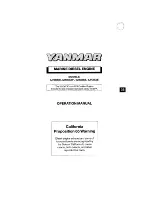
Operation
Solé, S.A. C-243 b, km 2 · 08760 Martorell (Barcelona) ·Tel. +34 93 775 14 00 · www.solediesel.com · [email protected]
17
Marine diesel
engines. Operator’s manual
4.
Check for leakage of oil, coolant and fuel.
5.
Knocking should die away as coolant temperature rises. No other defective noise should
be heard.
6.
Check for exhaust colour and abnormal odours.
4.3.
Stopping engine
1.
REMOVE ENGINE LOAD. Before turning off the engine, it
must be freed of all charges (disengaged gearbox to neutral)
2.
TURN THE KEY TO STOP POSITION. The key automatically
returns to the OFF position. All instruments are off.
3.
CLOSE THE SEACOCK.
If the needle of tachometer is marking counter rpm when the engine is off, turn the key back
to ON and then OFF again.
4.4.
Engine operation at low temperatures
Whenever the atmospheric temperature drops below zero, the following series of
circumstances occur:
▪
The cooling liquids may freeze.
▪
The oil becomes thicker.
▪
There is a drop in the voltage at the battery terminals.
▪
The inlet air temperature is low and the engine has difficulty in starting.
▪
The fuel loses fluidity.
To prevent the damage caused by low temperature operation, the engine should be prepared:
1.
Use special low temperature coolant or suitable anti-freezing agent concentration.
2.
Close the seawater cock, when the engine is stopped. Open the seawater filter cover and
start the engine adding a mixture of freshwater and suitable anti-freezing agent
concentration (see package labels) until the seawater circuit is filled completely. Stop the
engine and replace the seawater filter cover. Before starting the engine again, open the
seawater cock.
Repeat this operation whenever the engine is used at temperatures below 0ºC.
3.
Use oil with suitable quality and viscosity. SAE 15W40 is recommended. Under extreme
conditions contact with technical support.
4.
Cover battery with an adequate material to protect it against the cold. Check that the
battery is fully charged.
It is also advisable to use a dielectric spray on the electrical connections.
5.
When starting the engine, make sure that the glow plugs become hot enough.
6.
If necessary, replace the diesel oil by a specified diesel oil type for low temperatures.
The accumulation of impurities in the fuel tank could cause faulty firing.
All engines not in use are subject to rusting and corrosion of machined surfaces that are not
protected with a paint coating. The degree of corrosion depends on meteorological changes and
climatic conditions. The following recommendations are therefore of a general nature but they will help
prevent or reduce the risk of damage due to rusting.
















































